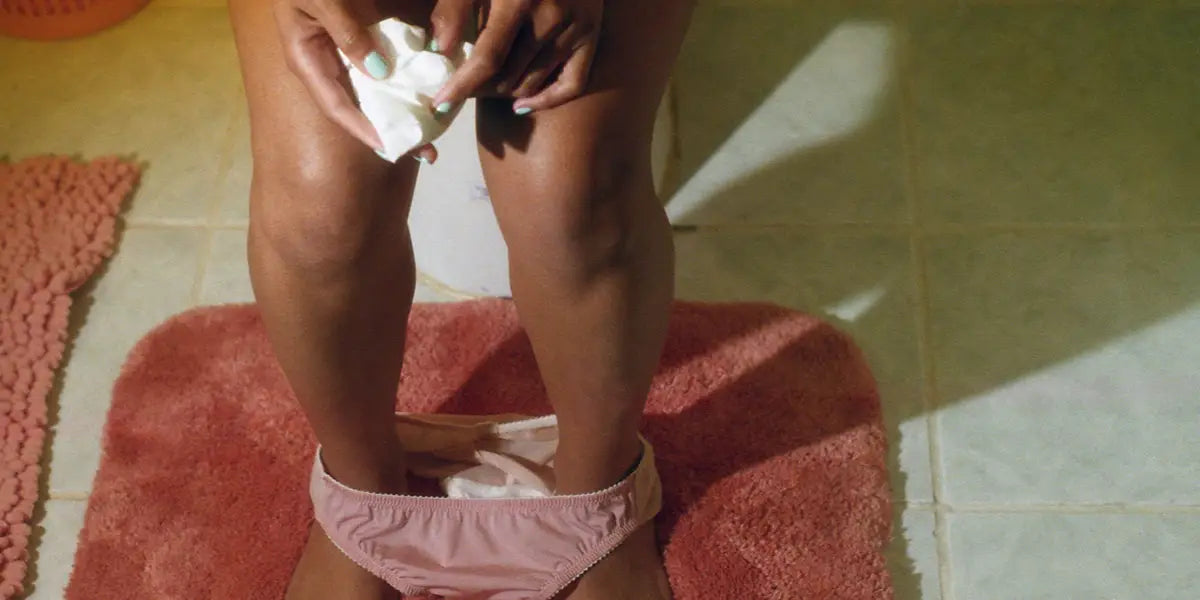Period Blood Clots: When to Freak Out (and When Not To!)

Let's face it, periods can be messy. From unexpected leaks to annoying stains, they throw curveballs our way. But what about those moments when you see blood clots in your period blood? It can be worrying, leaving you wondering if something's wrong down there.
We're here to shed some light on period blood clots. We'll break down the potential causes, when they're normal, and when to reach out to a healthcare professional. Plus, we'll share some handy tips for managing your period with or without clots, because comfort and confidence are key!
So, What Exactly Are Period Blood Clots?
During your period, the lining of your uterus sheds. This shed lining mixes with menstrual blood, and sometimes these clumps can form period blood clots. They can vary in size, from tiny pea-sized ones to larger ones the size of a quarter (or even bigger in rare cases).
Are Period Blood Clots Normal?
The short answer? Yes, often they are! In fact, it's pretty common to see some clots during your period, especially on heavier flow days. These clots usually have a smooth, red appearance and break down easily.
What Causes Blood Clots During Your Period?
Several things can cause period blood clots:
Hormonal fluctuations:
A study published in Current Opinion in Obstetrics and Gynecology explores the regulation of menstruation and highlights how oestrogen and progesterone levels play a crucial role. Oestrogen and progesterone play a big role in your menstrual cycle. When oestrogen levels drop right before your period, the lining of your uterus starts to break down. This breakdown can lead to the formation of clots.
The rate of shedding:
If your uterine lining sheds quickly, the blood might not have enough time to completely break down before leaving the body, forming larger clots.
Uterine health conditions:
In some cases, underlying uterine conditions like fibroids or polyps can cause irregular shedding and potentially larger clots. If you're concerned about fibroids and their potential link to your period, a doctor can discuss treatment options.
When Should You Be Concerned About Period Blood Clots?
While most period clots are harmless, there are some situations where it's best to check in with your doctor:
Excessive clotting:
If your period consists mainly of large, frequent clots that impact your flow and activity level, it's worth getting checked out.
Heavy bleeding:
Bleeding so heavily that you need to change period pants, pads or tampons every hour for several hours in a row could be a sign of an underlying issue.
Unusual colour or smell:
Blood clots with a greyish, green, or yellow look, or accompanied by a bad odour, may indicate an infection.
Severe cramps:
Painful cramps that interfere with your daily activities alongside large clots can be a cause for concern.
Sudden changes in your period:
If you have a sudden increase in the size or frequency of clots compared to your usual cycle, it's best to check in with your doctor.
Managing Your Period with Confidence
Whether you experience clots or not, here are some tips for a smoother period experience:
Embrace period-friendly underwear:
Swap the disposable pads and tampons for leak-proof period underwear like fluxies! They come in different styles and absorbencies, offering comfort, confidence, and peace of mind, even on heavy flow days (with or without clots!).
Track your cycle:
Tracking your cycle patterns can help you understand your normal clot formation and adjust your product changes accordingly. There are many great period tracking apps out there to help you stay on top of things. We love Flo's tracker.
Stay hydrated:
Drinking plenty of water throughout your cycle can help thin your blood, potentially reducing the formation of large clots.
Listen to your body:
Don't push yourself too hard during your period. Get enough rest, eat healthy foods, and prioritise activities that make you feel good.
Heat it up:
A warm compress or heating pad on your lower stomach can help reduce cramps and discomfort, regardless of whether you experience clots.
Remember, you're not alone!
Period blood clots are a common occurrence for many women. By understanding what's normal and when to seek advice from a doctor, you can navigate your period with confidence. And don't forget, at fluxies, we're always here to support you with comfortable, reliable period underwear solutions, no matter what your cycle throws your way!
FAQs: Period Blood Clots
Here are some of the most commonly asked questions about period blood clots, answered:
Q: Are period blood clots normal?
A: Yes, in most cases! Small to medium-sized clots (think pea-sized to quarter-sized) are pretty common, especially on heavy flow days. They usually have a smooth, red appearance and break down easily.
Q: How big can period blood clots be?
A: Typically, they're pea-sized to quarter-sized. However, if you experience much larger clots or ones that are frequent and significantly impact your flow, it's best to see a doctor.
Q: I have bad cramps and large clots. Should I worry?
A: Painful cramps along with large, frequent clots can be a cause for concern. It's best to get checked out by a healthcare professional.
Q: Can birth control affect period blood clots?
A: Some types of birth control can influence blood clots during your period. Hormonal birth control like the pill or IUD can regulate your cycle and potentially reduce the formation of clots. A study published in Human Reproduction Update explores the use of combined hormonal contraceptives and the risk of blood clots. It's important to remember that birth control methods can affect women differently, so always discuss your specific situation and concerns with your doctor.
Q: I'm worried about using tampons with blood clots. Is this okay?
A: Tampons can be safe to use with period blood clots, as long as you choose the right absorbency for your flow and change them regularly (every 4-6 hours). However, if you find it uncomfortable or feel worried that clots are getting trapped, it might be best to switch to pads or period underwear for that cycle. The choice depends on your comfort level and flow.
Q: Can exercise worsen period blood clots?
A: Generally, exercise is beneficial for your overall health and can even help regulate your cycle potentially reducing clots. However, during particularly heavy flow days with large clots, you might want to adjust your routine. Go for gentler activities like yoga or walking instead of high-impact exercises. Listen to your body and prioritise what feels good for you.



